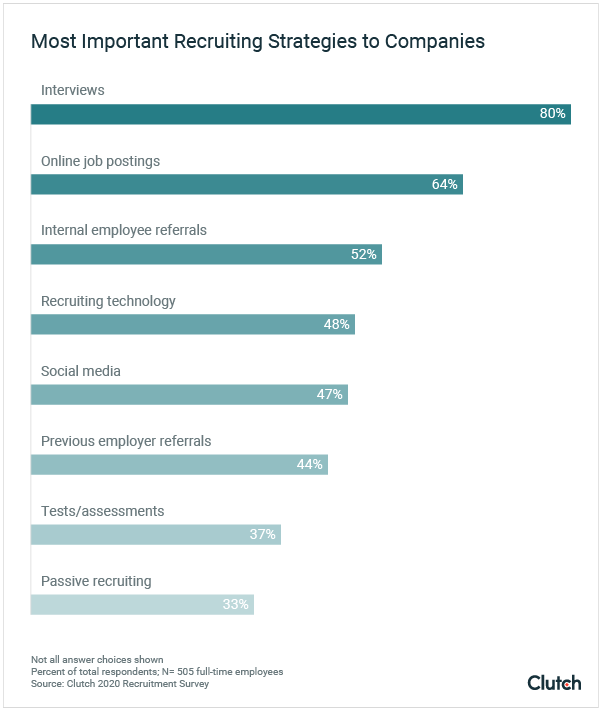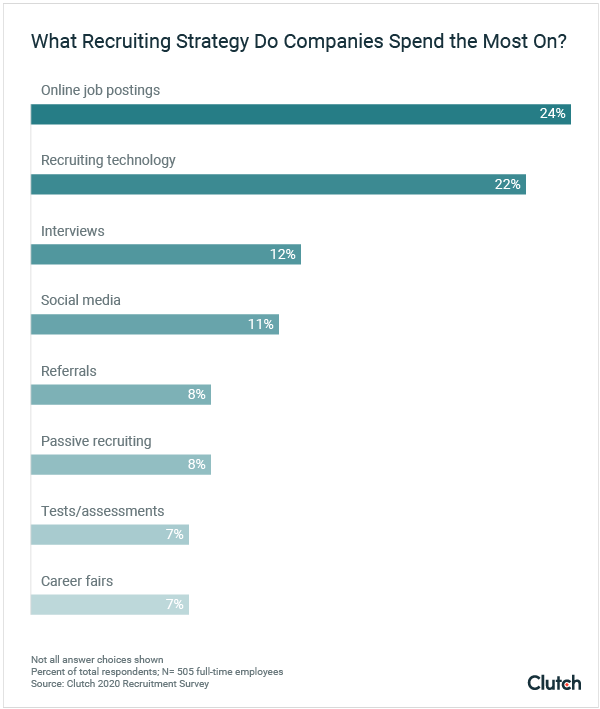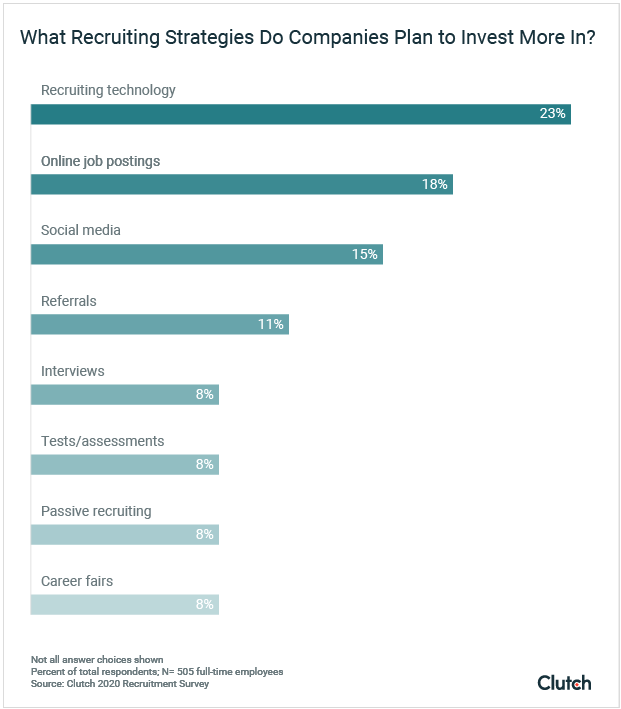

Updated January 3, 2025
Companies sometimes make serious mistakes when recruiting new talent. Businesses should consider 7 recruitment strategies to hire top talent, according to our survey of 505 full-time U.S. employees. Strategies such as candidate assessments, passive recruiting, and applicant tracking systems can reduce mistakes and improve a company’s hiring process.
Recruiting new employees can be complicated for companies.
Some candidates ace the interview yet fail at the job. Some companies painstakingly post a job description online only to realize they posted to job boards that aren’t relevant to the position.
Looking for a Human Resources agency?
Compare our list of top Human Resources companies near you
Growing companies can be overwhelmed by the administrative demands of hiring. Small businesses may splash their job listings across social media but fail to receive relevant resumes.
Recruiting mistakes are frustrating, embarrassing, and expensive for businesses: 62% of companies spend more than $10,000 per year implementing recruiting strategies, according to Clutch's survey data.
Mistakes businesses make when recruiting can be costly and damaging. Many companies simply cannot afford these errors.
We surveyed 505 recruitment professionals to learn about the employee recruitment strategies their company uses, which ones they consider effective, and what changes they anticipate making in recruiting in 2020.
Businesses should adopt these 7 top recruiting strategies to avoid mistakes and hire top talent:
Adding a new employee comes with challenges and questions for businesses. Can the candidate do the job? Are they reliable? Will they get along with their co-workers?
To receive honest answers to these questions, companies must ask candidates questions during interviews that reduce the likelihood of rehearsed answers.
Already, 8 in 10 companies (80%) say that interviews are essential to hiring the best employees.

Businesses see the importance of job interviews: The second-most-common recruiting strategy businesses find essential is online job postings, at only 64%.
Experts say companies must remember that interviews exist to provide insights about candidates that resumes do not.
Jesse Silkoff, founder of MyRoofingPal, an online marketplace that connects people with local residential and commercial roofers, recommends asking questions that foster an authentic, conversational tone.
“I used to use a strict, by-the-books, question-after-question interview style,” Silkoff said. Then, during MyRoofingPal’s first year, Silkoff hired a candidate who aced the interview but struggled in the job.
“I think if I had a less rigid interviewing style, I would have noticed that his answers seemed very generic,” Silkoff said. “Unfortunately, that ended up being someone who said the right things but didn't have the qualifications or the work ethic when it came to actually following through.”
There are simple ways for companies to reduce rehearsed answers at their interviews, including asking the candidate:
All of these questions are specific and personal, which makes it more difficult for a candidate to deliver a generic answer.
Doing well in a job interview does not always mean a candidate is ready to succeed in a role. Businesses should use job tests and assessments during the recruitment process to ensure that promising candidates will become effective employees.
In fact, more than one-fifth of companies (21%) wish they hadn’t relied only on interviews and also used candidate tests and assessments when hiring employees.

Businesses can assess job candidates using different types of tests, including:
Consider the experience of a company seeking an entry-level transcription specialist. Kevin, a recent college graduate, applies for the role. He has a strong resume and impresses recruiters during both phone and in-person interviews. Kevin is hired for the job, and within his first week of work, his company learns that he is a far weaker typist than he let on.
What will his company do? One option is to fire Kevin, while another is to train him on typing. They could even find Kevin a new role within the company.
All of these options are expensive and time-consuming, though. Had Kevin’s company simply assessed him with a typing test, it would have been clear he wasn’t up to the job.
Companies should test every job candidate with a sample job task to make sure they can do the work the role demands.
Posting a job description online may seem like a simple task. In reality, planning, writing, and posting successful online job postings may require assistance from a recruitment professional.
Despite seeming simple, nearly one-quarter of companies (24%) spend more money on online job postings than any other recruiting strategy.

In comparison, fewer companies spend their recruitment budget the most on recruiting technology (22%), interviews (12%), social media (11%), and candidate assessments (7%).
Online job postings cost companies money because creating them is more complicated than they may appear. With many sites and strategies available to businesses, recruitment specialists can help determine which job boards and online postings are worth investing in.
According to Google, there are six places to post online job descriptions:
Consider the experience of a medium-sized tech company that wants to hire a management-level HR specialist, an entry level business analyst, two web design freelancers, and a small group of summer interns. The company may have questions such as:
The job description for a summer intern is likely to read differently than the technical wording of a web design post, so companies need specific and targeted language for each job posting.
Also, finding summer interns may best be accomplished through social media, while discovering HR specialists is likely to require accessing HR-specific job boards such as the Society for Human Resource Management (SHRM). Businesses should plan to post across different types of job boards and online job search resources to find the best talent.
Partnering with recruitment agencies with online job posting expertise can help companies hire the employees necessary to operate a successful business.
Today, more than 7 in 10 adults (72%) use social media multiple times per day. Despite the massive presence of social media in people’s daily lives, companies should operate a targeted, selective social media recruiting strategy to reach relevant job candidates.
Twenty-four percent of companies (24%) say that social media is their most ineffective recruiting strategy.

Experts say that some companies find social media recruiting ineffective because they fail to post in the right places or track their efforts.
Kaitlyn Holbein, CEO and founder of The Employer Brand Shop, a boutique recruitment marketing and employer branding agency, says that companies sometimes make two significant mistakes when recruiting through social media:
Holbein suggests that companies invest in paid, targeted social media recruitment that puts job information in front of the best candidates. Holbein says it is also essential to track and record which candidates apply to jobs through social media. A candidate may find your posting on social media but apply using your website, so it's important to ask how they first learned about the listing.
Robert Moses, founder of The Corporate Con/noisseur, which helps businesses and job-seekers with digital marketing, once worked with a business in Minnesota that was struggling to hire seasonal employees.
The company ran targeted Facebook advertisements to people who lived within 10 miles of their store to improve hiring. People who clicked on the ad were routed to the business’ website, where they were invited to apply for the role.
The company calculated that the return on investment for this targeted advertisement was 87%. In fact, the business received so many applications that it had to suspend the advertising campaign.
Targeted, selective social media recruitment has a clear return on investment: It attracts the best job candidates.
Managing job postings, resume banks, applications, and the candidate interview process can be challenging for a growing company. To reduce the amount of work necessary to recruit top employees, growing companies should invest in an applicant tracking system.
Close to one-quarter of companies (23%) already plan to invest more in recruiting technology in the next year.

Applicant tracking systems help companies:
Almost every Fortune 500 company uses an applicant tracking system. Small businesses should, too, to track recruiting data, automate recruiting processes, and centralize the hiring process.
Companies want to be sure they hire the best people. Businesses can benefit from an inexpensive and effective form of talent discovery by offering rewards for employee referrals.
Referrals give employees the opportunity to recommend people for open jobs at their company.
Only 1 in 10 companies (11%) plan to invest more in employee referrals in the next 12 months, though.

In comparison, nearly one-quarter of companies plan to invest in recruiting technology (23%) and online job posting strategy (18%).
Offering bonuses for employee referrals is a simple and inexpensive way for large and small businesses to hire the right people. Businesses should ensure that any referral hires will work out before rewarding the referrer, though.
At Go-Forth Pest Control, a pest control and lawn care company, employees receive a $500 bonus if they refer someone to the business who is hired and then completes 6 months of work.
Leah Hazelwood, Go-Forth’s vice president of marketing and administration, says employee referrals are essential for a medium-sized business that has been family-owned and operated since 1959.
“Referrals have led to some of our best employees,” Hazelwood said. “They also reinforce our sense of team and extended family.”
Employees must be aware of the value of referrals to make it a successful recruiting strategy.
Companies can highlight the value of referrals with flair: Consider the power of presenting an employee who referred a recent hire a $100 bill at an all-staff meeting. Such a simple demonstration shows employees the importance and literal value of a referral program.
An internal referral program is essential to hiring the best employees when implmented correctly.
Not every future employee is actively looking for a new job. This means businesses should develop a “passive recruiting” strategy to hire top talent.
Just 8% of companies plan to invest more in passive recruiting in the next 12 months.

Passive recruiting, however, is a low-risk, high-reward strategy that can attract top employees.
It’s October, and a fast-growing company in a competitive market needs to fill a slate of entry-level positions. Generally, however, the company makes its entry-level hires in the spring and summer as students graduate college.
Without an upcoming commencement, what should the company do?
Through passive recruiting, hiring managers could identify a group of recent college graduates who are approaching 6 to 18 months of tenure at their current company.
The hiring manager can send a LinkedIn message to each candidate explaining the role and inviting them to apply. This way, the company can contact talent already employed by another company.
Passive recruiting helps improve the odds that companies are engaged with more worthy candidates. Just because an employee isn't actively seeking a job doesn't mean they wouldn't be interested in an opportunity at a different company.
Effective recruiting strategies are essential for any company that wants to avoid common recruiting mistakes and hire the best employees.
By implementing top recruiting strategies, companies will have an organized and targeted hiring process.
When developing a recruiting strategy, businesses should remember the importance of:
With a strong recruiting strategy, companies will compete for top talent and operate a stronger business.
Clutch surveyed 505 full-time employees in the U.S.
Sixty-two percent (62%) describe their role as a hiring manager; 50% as a human resources generalist; 34% as recruiting or staffing specialist; 20% as an executive; 10% as a consultant; and 5% as other.
Twenty-four percent (24%) live in the Midwest; 18% in the Northeast; 35% in the South; and 19% in the West.
Six in 10 respondents (60%) are female, and 40% are male.
Forty-three percent (43%) of respondents are ages 18-34; 47% are ages 35-54; and 10% are 55 years old and above.


